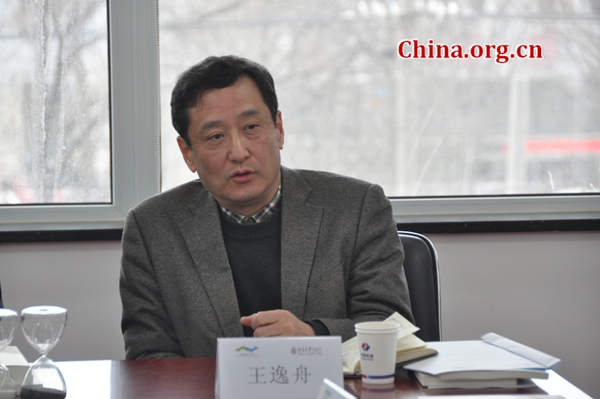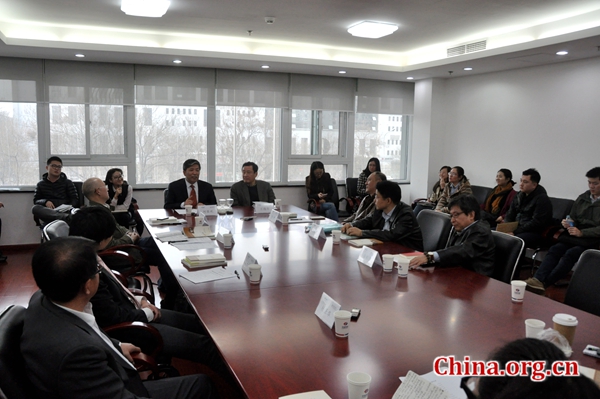Experts: China's diplomacy should be human-oriented
- By Zhang Rui
 0 Comment(s)
0 Comment(s) Print
Print E-mail China.org.cn, March 24, 2016
E-mail China.org.cn, March 24, 2016
|
|
|
Wang Yizhou, author of the new book "Creative Involvement: The Transition of China's Diplomacy" and the vice-dean of the School of International Studies at Peking University, speaks at a round table meeting organized by the Charhar Institute focusing on China's diplomacy transition in Beijing on March 22, 2016. [China.org.cn] |
|
|
|
Experts shared opinions at a round table meeting organized by the Charhar Institute, focusing on China's diplomacy transition in Beijing on March 22, 2016. [China.org.cn] |
A round table focusing on China's diplomacy transition was held in Beijing on Tuesday as experts assert the new trend of diplomacy should be human-oriented.
The meeting was organized by the Charhar Institute for the release of a new book, entitled "Creative Involvement: The Transition of China's Diplomacy."
The author of the book, Professor Wang Yizhou, a famous expert of international political science and the vice-dean of the School of International Studies at Peking University, said that the new "human-oriented" diplomacy policy is not only about how the Chinese government should protect overseas citizens and their interests, but also about how to make every citizen realize their rights and obligations.
Wang was also the former deputy director and senior research fellow at the Institute of World Economics and Politics (IWEP), Chinese Academy of Social Sciences (CASS).
"Citizens can independently participate in diplomacy, rather than waiting for the government's help," the expert said, "China's diplomacy should go from 'small' style diplomacy to 'pyramid' style diplomacy. The government's strategy is important indeed, but its base should be the social organizations and individuals that have channels and capabilities. Only when China's civil organizations and individuals stand up and recognize their own rights, can our country's diplomacy be appealing, rather than 'money-talks' diplomacy."
While addressing the issue of why some Chinese people feel uncomfortable to see the government aid other countries with big funds instead of investing that money into domestic development, Wang explained, "From the perspective of proportions, the foreign aid money has a lower proportion in gross domestic product than many countries in the world, and is lower than what China should be contributing in its current phase of opening up and reform. But now, citizens have a low sense of social participation, and there is low clarity in light of top-level decisions and a lack of discussion and exchanges of ideas."
He added, "Now, the issue is not about whether we are too generous to other countries, but about how to let society have more rights and make sure there is a mechanism that can correct wrong decisions. If China wants to go from an international system revolutionist to becoming a system builder, the citizens must participate in the process, rather than standing by and looking at the leadership's "gifted" money to other countries."
Professor Chen Zhirui from China Foreign Affairs University said that China should determine the relationships among the government, the nation and its citizens. Especially for China's "Belt and Road" initiative, there is a need for citizens to participate in markets and investment. China should offer social services and make rules to protect citizens' actions in the markets.
Professor Yin Jiwu, an associate professor at the School of International Relations and Diplomacy, Beijing Foreign Studies University, added that diplomacy should consider the technical and strategic levels when serving citizens. "Only when we treat citizens' interests as one of diplomacy's national strategic goals can we make diplomacy transition from one that is 'nation-centered' to one that is 'citizen-oriented'."
Renowned Japanese scholar Kato Yoshikazu and South Korean researcher Kim Sangsoon, both senior researchers from the Charhar Institute, also shared their opinions.
Kato Yoshikazu said that after World War II, many Japanese were cautious with the word "nation" and didn't like singing the national anthem and holding the national flag. Now, many disputes between China and Japan are also being provoked by the Japanese government. "If there were no Japanese enterprises, products and citizens, we could not imagine how bad the two nations' relationship could be. How has Japan walked out of the shadow of the war? It relies on the transition from 'nation-centered' to 'citizen-oriented' diplomacy."
Kim Sangsoon said Kato's remarks made him think of the agreement and deal reached by Japan and South Korea regarding comfort women. "South Korean's studies on this issue and efforts in pushing forward for a resolution were greatly helped by Japanese citizens. The concept of making the transition from 'nation-centered' to 'citizen-oriented' diplomacy should not apply only to a country, but to the whole world."
The meeting, the 39th round table of the Charhar Institute, was hosted by Ke Yinbin, secretary-general and a senior fellow at the institute.





Go to Forum >>0 Comment(s)